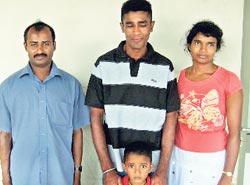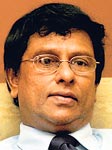It started off as a headache, but a headache that would not go off. For 39-year-old H.M. Mahinda Wijebandara, it was more a bother than an illness because he was a busy man, with his work at the 4th Engineering Regiment of the Sri Lanka Army.
Having served in many battle-areas such as Jaffna, Trincomalee, Vavuniya and Maduru Oya, in an army career spanning 20 years, and fending for his family which is living in Hataraliyedda off Kandy, as the sole breadwinner, there was no time to waste on such small ills like a headache. He had a wife and two daughters, nine and four years old, to look after.
But the persistent headache did compel him to seek treatment at the Army Hospital in Colombo in April, where the doctors checked his blood and urine.
 |
| Mahinda with Chammika and his family. |
The verdict was devastating -- waku gadu rogayak thiyenawa……he had a kidney disease.
The world collapsed around him and his family, including a dear nephew, Nishantha Mal Herath, who was in and out of their home. Not only did Mahinda need dialysis three times a week but would also have to find a kidney, and very quickly at that, because a transplant was vital to keep him alive.
The army understood his plight and sent him to live with his family and get dialysis at the Kandy Hospital’s Nephrology Unit.
Kalpana kara kara hitiya, says Mahinda, explaining that he was always in deep thought. Close kith and kin were frantic – how could they find a kidney. A relative volunteered to donate one of his O+ kidneys but backed out when he realized the intricacies of the transplant operation.
One day, Nishantha spotted an advertisement requesting people to donate kidneys and immediately called the phone number given. They had a different quest – not to donate but to plead for a kidney. It was initiator of the National Organ Donor Programme, Ajit F. Perera who answered but initially explained how the system worked.
But Nishantha persisted for he had a strong bond with his uncle. “Matama vuna wage,” he says, explaining that it seemed as if it had happened to him.It was, however, the time when many a soldier was sacrificing life and limb to rid the country of the scourge of terrorism.
And then suddenly Mahinda and family got a call that a donor, Chammika Prasad Rajapakshe, 31, with an O+ kidney had been found in the programme. An exception to the rule of not getting involved in the donor-patient matching system would be made in Mahinda’s case.
“I saw the advertisement requesting organ donations by chance,” says nephew Nishantha, while Chammika, a father of two, from Peradeniya says he always wanted to donate a kidney.
He married young and wanted his children to be of a certain age, says Chammika, adding that his wife has given him her blessings to go ahead and donate a kidney.
Now both donor and receiver are undergoing a battery of tests, before the transplantation, leaving not only Mahinda and his family beaming but also Chammika smiling in satisfaction.
All about the programme
The National Organ Donor Programme faced a dilemma, when Mahinda’s nephew, Nishantha contacted its initiator, Ajit F. Perera.
Under this programme, a first in the country, people who wish to donate an organ may register by filling a form including vital information such as blood type. Once they register, the data is computerized and matched by computer with the patient pool provided by the renal units of Kandy, Anuradhapura, Colombo and Jayewardenepura Hospitals.
 |
| Ajit F. Perera |
“We didn’t want to get involved and there was little I could do,” says Mr. Perera, explaining that Mahinda’s Brigade Commander Mahinda Ambanpola called asking him to help, followed by another call from his Commanding Officer Gunasekera.
The war was ending and a decision was taken to make this a “special one-off case” as a tribute to all the war heroes who had saved this country from terrorism, says Mr. Perera.
When checked, Chammika’s name came up on the screen as having an O+ kidney and arrangements were made to proceed with the matching.
Twenty people who wish to donate their kidneys while alive are already registered with the programme launched on March 31, this year, while 700 have pledged their kidneys after death.
Mahinda’s, hopefully would be the first transplant to be carried out by matching patient and donor under the programme, it is learnt.
The programme is a collaboration between the Kidney Transplant Support Foundation (KTSF) founded by Mr. Perera and the National Kidney Foundation of Sri Lanka headed by Dr. A.M.L. Beligaswatte, a former Director-General of Health Services.
Those who wish to help save a life by donating an organ may contact Mr. Perera on Phone: 00-94-112-824373 or 00+94-115-553890/1; Mobile: 00-94-722-247236 or Fax: 00-94-112-824373/94-115-542643 |


